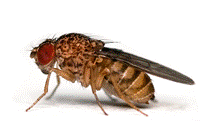Papers in the Biological Sciences

Lawrence G. Harshman Publications
Document Type
Article
Date of this Version
2002
Citation
Aging Cell 1 (2002), pp. 140–148.
Abstract
The purpose of this study was to investigate medfly longevity and reproduction across a broad spectrum of diet restriction using a protocol similar to those applied in most rodent studies. Age-specific reproduction and age of death were monitored for 1,200 adult males and 1,200 females, each individually maintained on one of 12 diets from ad libitum to 30% of ad libitum. Diet was provided in a fixed volume of solution that was fully consumed each day, ensuring control of total nutrient consumption for every fly. Contrary to expectation and precedence, increased longevity was not observed at any level of diet restriction. Among females, reproduction continued across all diet levels despite the cost in terms of increased mortality. Among males, life expectancy exceeded that of females at most diet levels. However, in both sexes, mortality increased more sharply and the pattern of survival changed abruptly once the diet level fell to 50% of ad libitum or below, even though the energetic demands of egg production has no obvious counterpart in males. We believe that a more complete picture of the life table response to dietary restriction will emerge when studies are conducted on a wider range of species and include both sexes, more levels of diet, and the opportunity for mating and reproduction.


Comments
Copyright © 2002 Blackwell Publishing Ltd./Anatomical Society of Great Britain and Ireland. Used by permission.